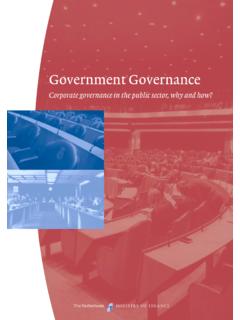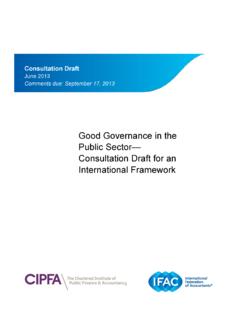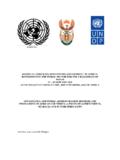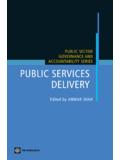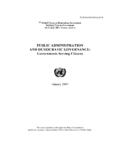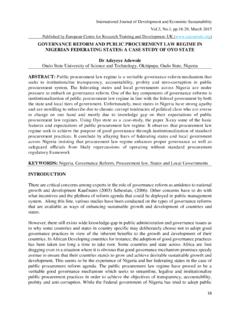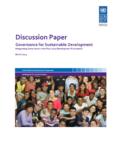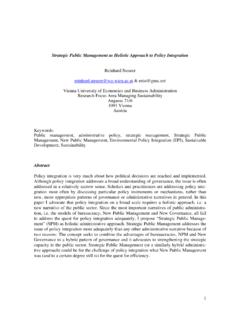Transcription of Ethics, Religion and Good Governance - JOAAG
1 Noor, A. (2008). ethics , Religion and good 62. Governance , JOAAG , Vol. 3. No. 2. ethics , Religion and good Governance1. Abdun Noor2. Abstract With the increasing role of the state in modern societies, bureaucratic control in social and economic fields and the increasing use of administrative discretion in various matters, scholars and development partners have put emphasis on the quality of its Governance . Experts opine that while making decisions public bureaucracy always faces two conflicting situations such as between serving the personal or group interest and serving public interest.
2 Therefore, for keeping the behaviour of public officials congruent with public interest, along with various institutional checks, the question of morality of the administrators becomes a principle concern in modern administrative process. An attempt has been made in this article to analyse the dynamics of public administration and the consequent role of ethics in them. The author further argues that the universal basis for achieving uniformity in human behaviour regarding rightness and wrongness should be some impersonal ethical code, which can only be achieved from Religion .
3 Keywords: good Governance , public Administration, ethics , Bureaucracy, Administrative discretion, Corruption, Morality, Religion . 1. Revised version of the paper presented in an international training programme on good Governance in Rural Development held at the Bangladesh Academy for Rural Development(BARD), Comilla, Bangladesh on 9-21 April, 2007, organised in collaboration with the Commonwealth Secretariat, The author expresses his gratitude to Dr. Shahjahan Hafiz Bhuiyan of Kazakastan University for his comments on an earlier draft of this analysis.
4 2. Department of public Administration, University of Chittagong, Bangladesh. Email: 62. Noor, A. (2008). ethics , Religion and good 63. Governance , JOAAG , Vol. 3. No. 2. Introduction One of the serious challenges facing mankind in organized social life is ethics - that is, the problem of choice between good and bad, do's and do not's etc. All the creations in this natural world follow certain fixed laws of nature. That is why we can exactly predict when the sun will rise tomorrow. But we cannot predict human behaviour in the same way.
5 Nobody can confidently say that two individuals would behave in the same way tomorrow as they do today, because man has been endowed with the freedom to decide, which other creations do not possess. That is why philosophers and scholars have emphasized ethical development of human beings to ensure rational behaviour in society. This paper attempts to highlight the role of ethics in ensuring good Governance and the importance of Religion as its basic foundation. The article is divided into five sections. Section one provides conceptual clarifications.
6 Section two discusses the different views of public administration research on the control over public officials in order to make their behaviour consistent with public interest. Section three presents cases regarding administrative discretion of public officials and the consequent role of ethics . The importance of Religion as the universal basis of ethics has been discussed in Section four. Section five succinctly summarizes the discussion. Conceptual Clarifications The terms Governance and good Governance have received wide attention in the contemporary development discourse.
7 International development partners are increasingly putting pressure on developing countries, as a condition to receive assistance, to make reforms that ensure good Governance . An attempt has been made here to analyse the concepts of good Governance ' and public administration' and their relationship with ethics '. Governance and good Governance Governance is a dynamic connotation which according to the Oxford Advanced Learner's Dictionary means, the way in which a country is governed (Wehmeier, 2000). Simply put, Governance means the activities or process of managing public affairs.
8 It is different from government which is a physical entity encompassing various institutions ( , legislature, executive and judiciary) and their actors who are authorized to exercise sovereign power of the state. Governance is thus a qualitative expression and a normative concept. The idea entered into the landscape of public administration in late 1980s and early 1990s as the neo-liberal oriented Structural Adjustment Policies (SAP) failed to produce expected results in developing countries (Cheema, 2000). It was first highlighted in a World Bank report on Sub-Sahara Africa in 1989(World Bank, 1989).
9 Based on the development experience in the African countries, the World Bank argued that much of the failure was due to the crisis of Governance '. In South Asian context, Bangladesh is frequently used as a case how poor 63. Noor, A. (2008). ethics , Religion and good 64. Governance , JOAAG , Vol. 3. No. 2. Governance affects its overall development process3 According to Camp4, Bangladesh's significant problem with democratic stability and impede economic growth (Camp, 2005). A 1992 World Bank book defines Governance , as the manner in which power is exercised in the management of a country's economic and social resources for development (World Bank, 1992).
10 An International Institute On Governance (IOG) was also founded in Ottawa in 1990, to explore, share and promote good Governance in Canada and overseas (Saner, Mark and Wilson, 2003). From the IOG perspective, Governance comprises the traditions, institutions and processes that determine how power is exercised, how citizens are given a voice, and how decisions are made on issues of public concern (Graham, Ames and Plumptre, 2003). When we precede Governance with the favourable connotation good , we certainly add some value-assumptions to it.


